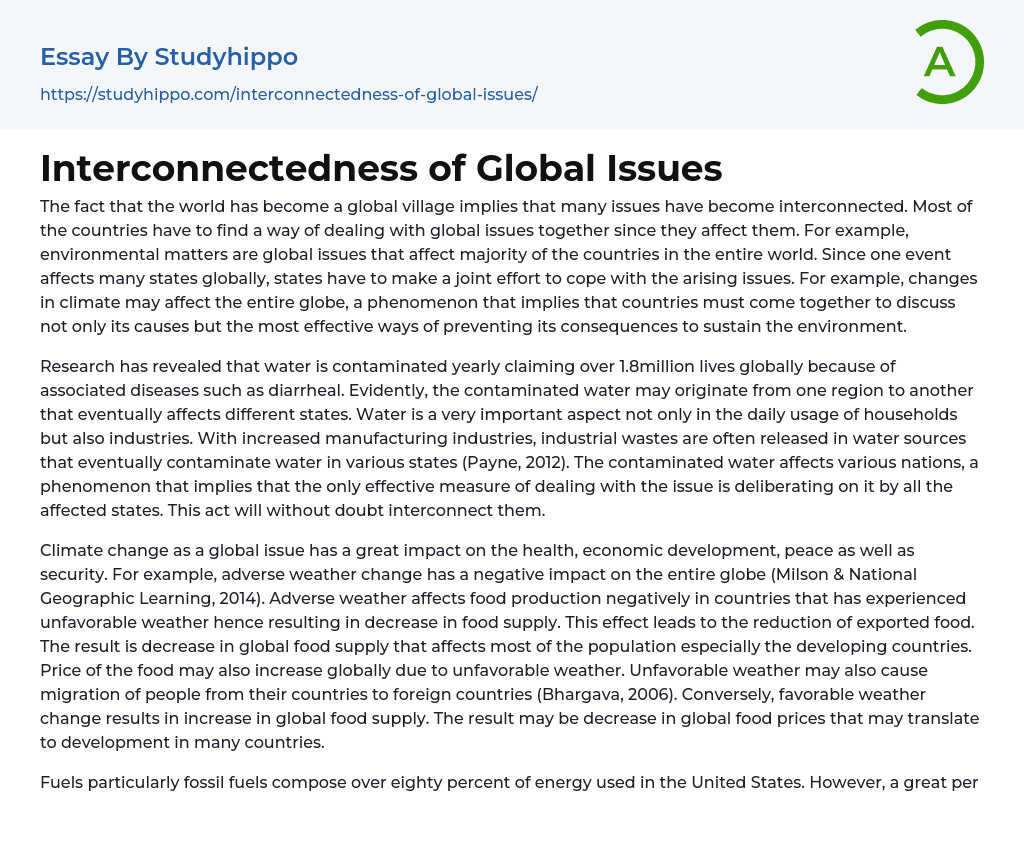The fact that the world has become a global village implies that many issues have become interconnected. Most of the countries have to find a way of dealing with global issues together since they affect them. For example, environmental matters are global issues that affect majority of the countries in the entire world. Since one event affects many states globally, states have to make a joint effort to cope with the arising issues. For example, changes in climate may affect the entire globe, a phenomenon that implies that countries must come together to discuss not only its causes but the most effective ways of preventing its consequences to sustain the environment.
Research has revealed that water is contaminated yearly claiming over 1.8million lives globally because of associated diseases such as diarrheal. Evidently, the contaminated water may originate from one region to another that
...eventually affects different states. Water is a very important aspect not only in the daily usage of households but also industries. With increased manufacturing industries, industrial wastes are often released in water sources that eventually contaminate water in various states (Payne, 2012). The contaminated water affects various nations, a phenomenon that implies that the only effective measure of dealing with the issue is deliberating on it by all the affected states. This act will without doubt interconnect them.
Climate change as a global issue has a great impact on the health, economic development, peace as well as security. For example, adverse weather change has a negative impact on the entire globe (Milson & National Geographic Learning, 2014). Adverse weather affects food production negatively in countries that has experienced unfavorable weather hence resulting in decreas
in food supply. This effect leads to the reduction of exported food. The result is decrease in global food supply that affects most of the population especially the developing countries. Price of the food may also increase globally due to unfavorable weather. Unfavorable weather may also cause migration of people from their countries to foreign countries (Bhargava, 2006). Conversely, favorable weather change results in increase in global food supply. The result may be decrease in global food prices that may translate to development in many countries.
Fuels particularly fossil fuels compose over eighty percent of energy used in the United States. However, a great percentage of the supply originates from outside the borders of the U.S. (Bhargava, 2006). Many countries use fossil fuels that does not originate in their state. Supply of fossil fuels is affected by the place it originates from which then affects the global price. Countries have to purchase the fuels as determined by their host countries. Use of fossil fuels has been associated with health issues and development effects. For instance, power plants and transportation of the fossil fuels pose a health hazard from the place it was extracted to its destination. In most cases, fossil fuels are associated with respiratory health problems especially to children and the elderly globally. Generation of electricity from such fuels interconnects people to interact in various countries and continents (Payne, 2012).
Conclusion
The modern world is closely interconnected and thus the main reason as to why countries have to find a way of dealing with global issues. Common issues that connect states have a great impact in the lives of the people affect countries in the world. For
example, climate change affects the entire world and the countries have to make a joint effort to address such issues.
References
- Bhargava, V. K. (2006). Global issues for global citizens: An introduction to key development challenges. Washington, D.C: World Bank.
- Milson, A. J., & National Geographic Learning (Firm). (2014). Climate change. Independence, KY : National Geographic Learning.
- Payne, R. J. (2012). Global issues. White Plains, N.Y: Longman.
- Animal Welfare essays
- Zoo essays
- Plastic essays
- Waste Management essays
- Climate Change essays
- Global Warming essays
- Conservation essays
- Recycling essays
- Air Pollution essays
- Carbon Dioxide essays
- Climate essays
- Deforestation essays
- Ecology essays
- Endangered Species essays
- Environmental Issues essays
- Environmental Protection essays
- flood essays
- Greenhouse Gas essays
- Hurricane essays
- Nature essays
- Pollution essays
- Renewable Energy essays
- Sustainability essays
- Tornado essays
- Traffic essays
- Tsunami essays
- Water Pollution essays
- Beef essays
- Beer essays
- Beverages essays
- Bread essays
- Burger essays
- Cake essays
- Coconut essays
- Coffee essays
- Cooking essays
- Crowd essays
- Cuisines essays
- Dairy essays
- Desserts essays
- Dinner essays
- Drink essays
- Fast Food essays
- Favorite Food essays
- Food Safety essays
- Food Security essays
- Food Waste essays
- Fruit essays
- Ginger essays
- Hamburger essays




